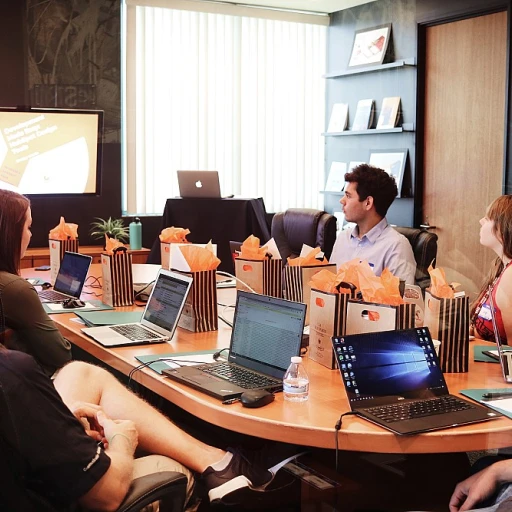Understanding the Role of Improvisation in Modern Workplaces
The Symphony of Work: Embracing Improvisation
In today's rapidly evolving work environment, the ability to improvise is becoming an invaluable skill. Much like a jazz musician who skillfully plays off existing chord progressions, employees are now required to navigate unexpected challenges and on-the-fly decisions. The modern workplace demands agility, and one way to foster this agility is through developing improvisation skills.
Just as a jazz solo thrives on creativity and spontaneity, the art of improvisation in the workplace is about being adaptable and quick-thinking. This doesn’t mean that traditional structures and processes are obsolete; rather, it’s about enhancing them with the ability to respond to unforeseen situations effectively. Workers equipped with improvisation skills can collaborate dynamically, enhancing both individual and team productivity.
The practice of improv in a professional setting draws deep parallels with learning jazz. While musicians use ear training and chord tones to improvise amidst complex jazz standards, workers can cultivate their own 'improv language' to thrive in modern roles. Building these improvisational skills involves constant practice, much like any jazz guitarist improving through time spent playing various jazz chords. Learning to improvise in the workplace helps individuals become more resilient and innovative.
As various industries are undergoing transformations, cultivating flexibility through improvisation is not just beneficial—it's essential. The future of work compels us to marry structured approaches with improvisational flair, leading us towards a more dynamic, robust work culture. For insights on how to equip yourself with future-ready skills, visit this essential skills guide.
Improvisation as a Catalyst for Innovation
Improvisation as a Driver of Creativity
In the evolving landscape of modern workplaces, improvisation is emerging as a pivotal skill for fostering creativity and innovation. Much like jazz musicians who seamlessly weave their solos into the fabric of a piece, employees who can improvise effectively contribute to a dynamic and adaptable work environment. This ability to think on one's feet and adapt to unforeseen circumstances is increasingly recognized as a crucial component of essential skills in the future workplace.
Drawing Parallels with Jazz
Jazz, a genre celebrated for its improvisational nature, offers valuable lessons for the workplace. Just as jazz musicians learn to play by ear, understand chord progressions, and master jazz standards, professionals can benefit from similar practices in their fields. Learning to improvise in a business context involves understanding the 'chords' of your industry—its fundamental principles and structures—and then learning to innovate within those frameworks.
Practicing Improvisation
Just as musicians practice scales and chord tones to prepare for jazz solos, professionals can engage in exercises that enhance their improvisational skills. Regular practice and play in low-stakes environments can build confidence and competence. This might involve role-playing scenarios, participating in brainstorming sessions, or engaging in cross-functional projects where creative problem-solving is required.
Benefits of Improvisation in Work
- Enhanced Creativity: Encourages out-of-the-box thinking, akin to creating a unique jazz solo.
- Increased Adaptability: Like jazz musicians adapting to the flow of music, employees learn to navigate changing circumstances.
- Improved Collaboration: Similar to a jazz ensemble, effective improvisation requires listening and responding to colleagues.
In conclusion, embracing improvisation in the workplace is not just about reacting to change but actively driving it. As organizations continue to evolve, the ability to improvise will be a defining trait of successful teams and individuals.
Building Resilience Through Improvisation
Strengthening Adaptability and Flexibility
The ability to adapt and remain flexible in the face of unforeseen challenges is a vital skill in the ever-evolving workplace. Just as jazz musicians seamlessly transition from one chord progression to the next, employees who master the art of improvisation can thrive amidst change. The benefits of improvisation here lie in its capacity to teach individuals how to think on their feet, quickly and efficiently.
Improvisation in the workplace functions much like playing a jazz standard. It requires a solid foundation in the basic elements, such as company procedures or project goals, much like understanding music theory. Once this foundation is established, employees can start to improvise, similar to how a musician might build a solo on top of familiar chords. This capability will help businesses maintain a competitive edge in unpredictable market conditions.
Practical Application in Stressful Situations
When unexpected issues arise, an employee with strong improv skills becomes akin to a seasoned jazz musician tackling a complex piece. Like jazz guitarists who rely on their ear training and understanding of chord tones, employees with practiced improvisational skills can analyze situations quickly and respond with innovative solutions.
This adaptability is honed through continuous practice, much like learning jazz improvisation. Regular exposure to new and challenging situations encourages learning improvise through hands-on experience, ultimately leading to greater resilience. Organizations committed to fostering these skills often experience increased innovation and more resilient teams, which are invaluable in times of crisis.
Practical Techniques for Learning Improvisation
Enhancing Improvisational Abilities with Effective Practices
Improvisation is an art that shares a striking resemblance to jazz, where musicians often express themselves through spontaneous solos. Just like learning any musical instrument, mastering the skills of improvisation in the workplace requires dedication, time, and some structured practice.
To begin learning improvisation, start by understanding the basic principles of jazz. Much like how jazz musicians learn to navigate chord progressions and play jazz standards, professionals can begin by grasping the foundational "chords" of improvisation. This means adopting a mindset that welcomes uncertainty and embracing creativity.
One effective technique to enhance your ability to improvise is engaging in "ear training." In the realm of music, musicians develop their ear to recognize different chord tones and play confidently within any jazz language. Similarly, you can enhance your professional "ear" by being observant and receptive to dynamic workplace changes.
Practice is key. Just as guitarists improve by playing various jazz solos and exploring jazz guitar techniques, you should regularly engage in activities that push your creative boundaries. Create mock scenarios or hypothetical situations where improvisation is required. This will help you learn to adapt to new challenges and find innovative solutions.
Another practical approach is to simulate real-life situations that might require improvisation. Think of how a jazz musician might prepare for a performance by improvising over jazz standards. You can mimic this by tackling complex projects or difficult conversations without a script, using these opportunities as a practice ground.
Finally, adopting the practice of regularly "playing" with your ideas and thoughts can significantly enhance your improvisational skills. The more you play, the more you'll notice patterns and start improvising effectively in various situations.
By dedicating time and practicing these techniques, professionals will find that they can learn to improvise efficiently, ultimately reaping the benefits that come from being adaptable and creative, much like a seasoned jazz musician in the professional world.
Improvisation in Remote and Hybrid Work Settings
Embracing Improvisation in Virtual Spaces
In the modern workplace, where remote and hybrid models are increasingly becoming the norm, improvisation skills continue to prove invaluable. Much like a jazz musician navigating an impromptu solo, adapting to the nuances of virtual collaboration requires a similar kind of agility and spontaneity. Learning to improvise effectively in these settings involves more than just honing traditional communication skills; it necessitates an astute ability to "play by ear," reacting to digital cues as naturally as one would to jazz chord progressions.
Improvisation in this context is akin to a musician practicing scales and jazz standards, equipping oneself with the versatility to perform a solo with creativity and confidence. As part of your learning journey, regular practice of active listening and the "jazz language" in meetings will help enhance your ability to adapt quickly. Start with ear training sessions tailored to the virtual workspace, designed to refine your perception of tone, tempo, and rhythm within digital conversations.
The benefits of improvisation begin to manifest as one becomes more adept at navigating the complexities of remote work environments. These skills not only enrich team dynamics but also build resilience and foster a culture that is open to innovation and change. Whether it's jumping into a team brainstorming session or leading a project in unfamiliar territory, the ability to improvise is your chord to success in remote and hybrid workspaces.
So, how can you incorporate jazz-like improvisational techniques into your remote work schedule? Begin by engaging in "improv" exercises, such as spontaneous discussions or problem-solving activities with colleagues, without sticking strictly to the "chord tones." These practices will cultivate a foundation of creativity and readiness, much like a jazz guitarist learning jazz standards to unleash their creative potential during live performances.
Remember, just as improving your jazz guitar skills takes time and dedication, so too does mastering improvisation in professional settings. By taking deliberate steps to build these skills, you'll position yourself to excel in the future of work, adapting creatively to challenges as they arise with the improvisational ease of an experienced jazz musician.
Future Trends: The Growing Importance of Improvisation Skills
Embracing the Improv Culture: The Workplace Trend of the Future
Improvisation is no longer confined to the stages of jazz music or theatre; it's making its way into modern workplaces as a vital skill. As we continue to embrace more dynamic, fluid work environments, being adept at improvisation could be what sets successful employees apart from the rest.
The skills required for jazz improvisation, such as listening, adapting, and creating on the spot, are parallel to the abilities needed in today’s fast-paced business world. Jazz musicians learn by immersing themselves in jazz standards and chord progressions, transforming these exercises into spontaneous musical solos and performances. Similarly, employees will benefit from learning and practicing improvisational techniques to thrive in evolving work environments.
The future workplace will increasingly rely on employees who can quickly adapt to change and create novel solutions in real time. This means developing what we might call a 'jazz ear' for business—a keen sense to pick up on subtle cues and swiftly adjust one's approach. The ability to improvise will become synonymous with innovation and resilience, helping employees navigate challenges with agility.
Technology plays a crucial role in this shift. With the rise of artificial intelligence and machine learning, tasks that follow specific rules can be automated, freeing human workers to focus on roles that require creative decision-making. Hence, the ability to improvise will help human talent retain relevance in a world where machines handle routine tasks.
For those considering how best to prepare for the future, immersing oneself in improvisation, much like a musician would with their guitar or piano to learn jazz, will be a strategic step. From understanding music theory to ear training, the skills that allow musicians to improvise can be translated into business acumen. As organizations continue to recognize the benefits of improvisation, investing time in learning this skill could offer significant payoffs.
In conclusion, the growing importance of improvisation in the workplace is evident. By placing a focus on this skill, individuals and organizations alike can embrace the rhythm of change, making room for continuous growth and innovation.














